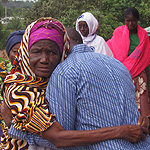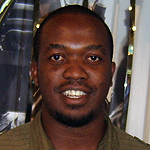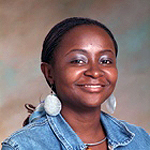Doing Nothing.
You lie frozen in the mahogany four poster bed in your apartment by the roadside where the cars never stop running. It is only your measured breathing that interrupts the incessant barking of the dog in the compound opposite. The determined movements on the pavement below and the barking of the dog have woken you up. You hear the raised voices outside your window. You listen to what is being said. A quick glance at your Sony Ericsson shows that is 1:26am. Chaos at this time of the night could only mean that thieves are trying to break in. Normal people do not have arguments at this time of the night. Your apartment sits atop a supermarket. There is an armed security guard for the supermarket. The security for the apartments is provided by an old Mugishu man who guards with a bow and arrow, and spends most nights in drunken sleep. That is why thieves had jumped over the fence a couple of nights earlier and tried to vandalise a Toyota Premio in the compound.
Toyotas are targets for car thieves because the demand for their spare parts is high. Your heart races. You hear the firm assurance in the voice of the man who shouts at the armed guard, ‘Askari open the car! Open the car now!’ The confidence with which he speaks makes you realise he is armed. Otherwise he would not order a security guard like that. You are too frightened to look out of your window. You try to regulate your breathing, afraid that the sound of your scared heart will echo down to the thieves below, who will look up at your window and maybe scale the wall up your balcony to try and break into your own apartment. Your mind races, wondering who to call for help. It is too late in the night to call the landlady. Her phone is probably off. You cannot call your siblings because you know they switch off their cell phones at night.
You think of the police patrol. It is useless to call 999. You have dealt with the police hotline before and know it is useless. The person at the end of the line will assure you that if the thieves have not broken into your home, it is ok... that the security guard is armed and will fight them off... and remind you that if they are to send backup to the apartments, they will need money for fuel. You remember Kisembo, the police officer who used to be in charge of the mobile police patrol for Kampala. You have his number, but it is useless. You are aware that he took on a lucrative policing job in Haiti. Your best friend’s brother is a policeman. You also have his number, but he has also taken on a job in Nairobi as a security consultant. You have no other options.
A woman’s screams shock you out of your frozen state, ‘Help me!’ she shouts. You think she has been waylaid by the thieves who have diverted her car to the parking in front of the building. There is an exchange of words between the men and the security guard. You hear the loud slamming of a car door, high heels running on tarmac, then a muffled sound. The guard shouts at the men, ‘leave her alone!’ You wait for a gunshot. For the sign that will signal that it is over. Instead you hear nothing but the squeaking of the metallic gate that leads to the tenants’ parking lot and then the screeching of a car as it violently reverses into the murram road, scraping the high hump. The car is followed by the sound of a motorbike speeding off. Silence.
Your breathing sounds in your ear like a gong. You are sweating. It seems like forever before cars start passing on the road again. You wonder what has happened. It is only 3:00 am in the morning. Sleep has been scared away by the scuffle you have been a silent witness to. You hear a thunderous sound in the distance and it grows nearer until you realise it is the sound of a cargo train. You count down the minutes waiting for the morning light to come through your curtains so you can go to work like nothing has happened. So you can block out the petrified voice of the woman and tell yourself that you could have done nothing.
The sound of your phone alarm wakes you up. It is 6:00am. You reach for the phone under your pillow, turn off the alarm and stay in bed. You convince yourself you only need five more minutes before you jump out of bed, so you close your eyes and drift off. Later when you wake up and check on your phone, you realise that you have been asleep for another hour. You are going to be late. You are an earlier riser because it is easier to drive in Kampala early in the morning when the traffic is still light and you can drive crookedly, dodging the potholes that dot the roads like it is part of their technical design. You joke with your friends all the time that it is only drunks who drive in a straight line on Kampala streets. Everyone else zigzags along to avoid the numerous potholes. The city council cuts the potholes into rectangular holes with the intention of filling them up. This process however, takes forever to complete so instead of the original potholes, the roads are now filled with sharp-edged squares.
When you go downstairs to the parking lot, the first thing you do is walk round your car to see that it has not been vandalised. Satisfied, you enter the car and drive off. You will call the caretaker when you get to work to find out what really happened. For now you concentrate on working your way round the crazy traffic in Kampala where drivers don’t obey traffic rules, and you have to fight for space with commercial mini vans, who don’t bother to join the queue but drive on the side sometimes pushing other vehicles off the road. You are careful on the road because your car is new and you do not want to scratch it.
When you finally get to work, your colleagues exclaim at your lateness. You are normally the second in the office after the office attendant. Your car is always the first one in the parking lot. You explain that you had an interrupted night so you slept longer. You do not want to tell them that you heard a woman cry for help outside your window and you did nothing but lie frozen in your bed. You do not want to tell them what a coward you are. So you walk to the kitchen to make yourself a cup of chamomile tea and sit at your desk. You need to calm your nerves. You do not realise you are shaking until you feel a burning sensation on your lap. You set down your cup and dial the caretaker’s number. You ask him if he heard the scuffle with the security guard. When he responds in the affirmative you go on to ask if the security guard was hurt. He says the guard was okay. No they were not thieves. It was a bunch of men who were forcing a woman to get into a car with them. He does not know where they came from. The woman, he said, didn’t want to get into the car, but he saw the men force her in and speed off. Another one took off on a motorbike. You thank him for the information and hang up. You sigh in drained resignation. You are convinced that the woman is dead. And you did nothing about it.
The newspapers over the last couple of weeks have been filled with stories of women being gang-raped and murdered. So the picture that flashes through your mind as you lay your head on your table is that of a dead woman being carried away by police. It was the last picture in the newspapers. You wonder if the caretaker noted the number plate of the car. Maybe they could go to the police with that lead. You blame yourself for being a coward and not looking out of your window. You could have parted the curtain slightly to see what was going on. May be you could have noted the make of the car and number plate. You are distracted the rest of the day and decide to feign sickness and go home and rest.
*
Three days later, you read about another rape and murder in the papers and a knot develops in your stomach. A body of a woman has been discovered not far from where you live. You know it is the woman whose scream you heard. Even though you never saw what she looked like, you just know it is her. It is too much of a coincidence that the body is discovered not far from your apartment block. You carry the newspaper with you and walk up to the in-house counsellor. You ask for an impromptu session and she lets you in. You have never used her services since she was hired over six months ago. You have never needed any help before. But this news is something else. You know you are going to lose your mind with self-loathing. You need to talk to someone. When you knock at her door she is surprised but nonetheless lets you in. You tell her you need a prescription because you know you are not going to sleep for a\ very long time.
She sits up in her chair and smiles. ‘Why do you think you need tranquillisers?’
‘I killed a woman,’ you quickly show her the newspaper. You watch her scan the story. She adjusts her glasses and smiles at you.
‘Nafula, this says that she was gang-raped and murdered. I do not see what role you had in this.’
‘You don’t understand, I did,’ you wring your hands, wanting her to believe your story. To help you deal with your guilt.
‘Would you like to talk about this?’
You nod and the words come gushing out. She takes notes. She recommends that you need to take the day off. It is a Friday. You nod, grab the paper and walk out holding it to your bosom.
You drive home in a daze and do not answer your mobile when it rings. You are focused on getting into the quietness of your apartment, to sit with your silence and guilt, and weep in silence for the woman. You decide you need some religion in your life again to help you deal with the guilt that is now flowing in your veins.
On Saturday you drive out to your church in Najera. You are looking for the priest to hear your confession. You have not been to church or confession in three years. When you enter the compound, the old red bricks of the small church looked more cracked than you remembered. Behind the small building is the skeleton of a bigger church being built by the faithful. You park your car under the mango tree and run to the vestry where you know Father Kasanvu will be working on the Sunday sermon. You knock on his door and enter. He looks up and his face breaks into a smile when he sees you.
‘Now what brings the prodigal daughter back to church? The angels in heaven must be rejoicing.’
You smile tightly and slump in the chair in front of him. Holding your handbag in your lap you lean over and whisper, ‘Father I have come for confession.’
‘I am swamped. Let’s fix the confession for later in the day when I will be freer.’
You reach over and grab his hand, ‘You don’t understand. I need the confession now. It has to be now.’ You close your eyes and start rambling, ‘Father it has been three years since my last confession. Forgive me for I have sinned terribly. I came today because I killed a woman.’
You open your eyes. You feel a lightness around your heart and you stare at him. The heaviness on your tongue has loosened. You quickly open your bag and take out the newspaper with the picture of the woman and continue, ‘I know it is her, Father. I heard the scuffle outside my apartment window. She cried for help and I did nothing. I should have called someone for help. She did not want to enter the car. She was forced. Father, I have not been able to sleep since I killed the woman. In the night she comes to me in my sleep. Her voice dances in my dreams and chases away the good dreams. It is a good-dreamer-chaser…’
You ramble on as Father Kasanvu listens to you. You see the bewildered look in his eyes, like he is judging you, but you do not care. All you know is that you want this ache that tightens its grip around you to end. You want the guilt to melt away. Most importantly you want the voice to die out so you can get back to the life you had before the night you heard the woman’s cry for help and lay frozen, too afraid to make the call that could have saved her life. 
Copyright
© African Writing Ltd & respective copyright
owners. Enquiries to permissions(at)african-writing.com.
![]()










